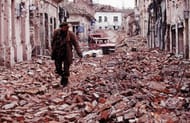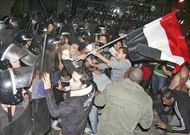Any football head that is a proponent of using sport to unify those on opposing sides cites the Christmas Truce of 1914. On Christmas day, 1914, British and German soldiers put their weapons down as they turned no man’s land into a football pitch. The truce led to carols being sung, prisoners swapped and a shared meal.
It’s a heartfelt story that’s been lionized by books and the big screen. But for all the goodwill that the world’s game generates, there is also a flip side.
It makes sense that such an international game would have its pitch turned into a battlefield. Football gives opposing sides the chance to definitively say, 'I’m better than you, don’t believe me, look at the scoreboard'. A hard-fought loss on a muddied pitch alone isn’t enough to bring countries to war. Rather, football gives patriots and politicians the little spark needed to inflame relations that had already been drenched in gasoline.
The Football War – El Salvador & Honduras

In a conflict that conflated sport and politics like no other, the small Central American countries of El Salvador and Honduras engaged in a 100-hour war after El Salvador qualified ahead of Honduras for the 1970 World Cup.
The tension between these countries started years before the war as thousands of Salvadorans emigrated to Honduras. The mass exodus from El Salvador took place due to an oppressive government, the increase in property costs, and the promise of land in Honduras.
Despite having twice as much land as El Salvador, Honduras had a significantly smaller population. El Salvador’s Atlantic coast neighbor was seen as the land of opportunity and as such by 1969, 350,000 Salvadorans had emigrated (mostly illegally) to their neighboring country.
Fed up with the influx of immigrants, Honduras citizens took matters into their own hands by beating, torturing, and murdering Salvadorans. In 1969 a land reform act was passed in Honduras that took back the lands purchased by many Salvadorans. Now fearing for their lives and having been stripped of their land, most Salvadorans returned to their home country. As a result of the forcible takeover of Salvadoran-purchased lands in Honduras, the government of El Salvador began claiming that these lands now belonged to their country.
With a border dispute already on the table, El Salvador and Honduras were grouped together in the semi-finals of CONCACAF’s 1970 World Cup Qualifying. As was to be expected, fights broke out between fans during the first two qualifying matches. With El Salvador’s media beating the drum, Salvadorans marched through the streets before the match with the goal of striking fear into the hearts of Honduran players.
The situation was so ripe with aggression that the Honduran national team had to be escorted out of the hotel and into their embassy. When the sun rose, two men had been murdered, seven people injured by the police, and some Honduran fans sexually assaulted and beaten.
As expected, the game had already been won before the kick-off. The result meant that the sides were tied on points and had to play a decisive third match on neutral grounds in Mexico City.
El Salvador went on to win the match and qualify for the tournament, but few Salvadorans cared, as the headlines were still wet with El Salvador’s pronouncement that it had cut off diplomatic relations with Honduras the day before.
The Football War ended just 100 hours after it began, though not before approximately 4,000 people were killed. A ceasefire was agreed to on July 18th but an official peace treaty wouldn’t be signed until 1980.
Croatian War of Independence – Croatia & Serbia

Despite declaring independence from Yugoslavia in 1991, effectively making Croatia a country of 4 million people, the diminutive Balkan country wooed the world and managed second place in the 21st edition of the FIFA World Cup. Although a team comprised of former Yugoslavian players surely would’ve boosted Croatia’s chances of besting France, that hope was dashed in 1991 after one of the most contentious and mythical soccer games ever played.
Yugoslavia had been a doomed experiment from the start. With ethnic, historical, and political differences aplenty, the country that formed after WWI was in a state of constant tug of war.
Apart from the Croatian Spring protests in 1970-71, the reign of Yugoslavia’s president Josip Broz Tito was a relatively peaceful one. His understanding and politically flexibility allowed him to appease each republic and province. Yugoslavia’s president and peacekeeper would die in 1980, leading to the breaking of the federation.
With Josip Tito out of the picture, no politician had the tact or political savvy to keep ethnic and political differences from boiling over. By 1990 Slovenia and Croatia wanted to distance their republics from Yugoslavia.
With relations soured, parties in favor of seceding came to power in Croatia and Slovenia. It was at this juncture that Red Star Belgrade traveled to Zagreb for a domestic league match.
With the election of nationalistic and pro-independence candidate Fanjo Tujdman just a week before the match, Croatia had sent a message to the world that they vehemently wanted independence. Consumers of Serbian media were thought to believe that at the hands of a Tujdman government Serbians in Croatia would be made second-class citizens and possibly exterminated. The nationalistic feelings between Serbs and Croats manifested itself during the match by way of an all-out brawl.
The game-day chaos that erupted in the stands and spilled out onto the streets was billed as a battle between the ultras of both clubs. These overzealous fans had been causing trouble for years. The recent elections were all the motivation needed to turn a sporting event into a violent cathartic experience.
No one knows for sure how it started, although historians believe the foul play began when Belgrade ultras began chanting, “Zagreb is Serbia” while marching towards the stadium. Upon entering Stadion Maksimir supporters were reported to have begun ripping out the seats of the stadium and throwing them onto Zagreb supporters below.
Croatians claim that the skirmish that saw countless spectators injured was initiated by the away fans and aided by the police who were captained by a Serbian and directed to attack only Dinamo Zagreb fans. Serbians, however, believe that the violence was planned out in advance. With no validated story in place, both countries have created their own nationalistic narratives.
However, what both sides seem to agree on is that this was the first unofficial battle of the Croatian War of Independence. While government records may have recorded the war to have started a year after the skirmish, a monument outside Dinamo Zagreb’s stadium accurately describes the sentiment of Dinamo supporters, “To all the Dinamo fans for whom the war started on May 13, 1990, and ended with them laying down their lives on the altar of the Croatian homeland.”
Football Riots - Algeria & Egypt

The clashes between Algerians and Egyptians that took place during the road to the 2010 World Cup weren’t politically charged. Unlike the previously profiled conflicts, these two countries were actually allies.
The two parties involved have a history of warm relations. Egypt’s former leader, Gamal Nassar, was a vocal proponent of the Algerian Revolution and in 1973 Algeria sent 3,000 troops to bolster Egypt’s military in its endeavor to retake the Sinai Peninsula from Israel. So if relations were so rosy between these two, what went wrong?
The animosity started in 1989 after Egypt defeated Algeria in the final qualifying round to advance to Italy '90. In the match’s aftermath, Lakhdar Belloumi attacked Egypt’s team doctor with a bottle leaving him blind in one eye.
Algeria’s best player of all time was sentenced to imprisonment by Egyptian authorities but managed to avoid the cell. With Algeria refusing to hand their beloved star over to Egyptian authorities, the player went on to become possibly the most famous sports star on Interpol’s wanted list. Interpol finally rescinded the warrant at the behest of Egypt in 2009.
Relations worsened in 1991 when Egypt refused to send a team to the African Nations Cup being hosted in Algeria. The Egyptian Football Federation eventually acquiesced to avoid a fine although as a form of protest sent their youth team.
The chief reason for the tense matches between Algeria and Egypt during the 2010 World Cup Qualifying campaign came down to the history of their sporting rivalry. This history led to a volleying of vitriolic media and Internet content in anticipation of their group matches. Internet websites were hacked, offhand memes circulated and the cyber war had begun.
The group stage rematch saw Egypt defeat Algeria 2-0. The game was of the utmost importance for both squads with Algeria needing only a point to advance to the World Cup and Egypt needing to win in order to survive.
This crucial win proved to be all the encouragement Egyptian fans needed to spill out into the streets of Cairo, block traffic, show off their homemade flamethrowers and cause general havoc. The Egyptian Health Ministry recorded 20 Algerians and 12 Egyptians having been injured as a result of the celebrations. Yet once the Algerian media got a hold of reports of violence, they added a little age-old media embellishing. Rumors began circulating around Algeria that women were sexually harassed, an Algerian supporter was burned alive, and that the brother of a famous Algerian rapper had been murdered.
After consuming such fudged reports, Algerians began looting Egyptians businesses leading to tens of millions of dollars in damage. Fans of Algeria became even more incensed after reports came in claiming that their team’s bus was pelted by rocks that left players injured as they made their way to the team hotel in Cairo.
With teams even on points, head to head matchups and goal difference, a decisive third match was scheduled in the neutral setting of Sudan. After Algeria’s win, Egyptian supporters received the same treatment the Algerian team did when it was in Cairo. Fans traveling in buses to the airport had their windows smashed as victims feared for their wellbeing.
Mirroring Algerian media outlets, Egyptian media ran far-fetched stories of Algerian jails being emptied and criminals sent to Sudan to terrorize Egyptian supporters. As false reports came in, Egyptians attacked the Algerian Embassy in Cairo. Police and fans engaged in a battle in front of the embassy as fans threw rocks and police threatened civilians. Mubarak’s own son rained down expletives on Algerian supporters over Egyptian media calling them terrorists and mercenaries.
During one of his many TV interviews, Mubarak’s son captured Egyptian sentiment towards Algerians during the aftermath of the football match by saying that Arab brotherhood doesn’t exist and claiming the Algerians can’t call themselves Arab until they learn how to speak proper Arabic.
